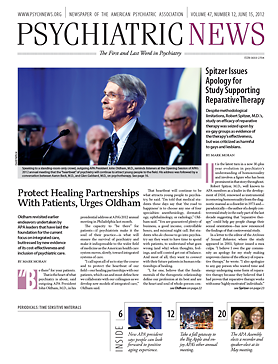With increased access to care and larger budgets made possible by government initiatives supporting mental health programs, the number of veterans diagnosed with posttraumatic stress disorder (PTSD) has greatly increased within the past few years, according to a study published in the May Psychiatric Services.
Eric Hermes, M.D., a research fellow in the Department of Psychiatry at Yale University School of Medicine, and his colleagues concluded that after a major increase in funding and services for the Veterans Health Administration (VHA), there has been an increase in the number of veterans seeking treatment for PTSD and other mental disorders. And although Iraq and Afghanistan service members and veterans showed the greatest increase in PTSD diagnoses, veterans from previous service eras accounted for the majority of those treated.
The researchers found that from 1997 to 2010 the total number of veterans who received at least one mental health contact increased at a rate of 9 percent annually. Of the total number of veterans who received mental health services in that period, nearly two-thirds (63.1 percent) received PTSD diagnoses in the period 2005 to 2010, compared with fewer than half (47.4 percent) diagnosed with PTSD from 1997 to 2005.
Using the VHA database, the researchers evaluated the use of specialty mental health treatment for PTSD and other psychiatric disorders from 2005 to 2010 and compared it with service use from 1997 to 2005.
To evaluate the data, they assessed utilization of mental health treatment by veterans, the intensity of treatment (that is, average number of mental health visits per veteran per year), treatment for PTSD versus for any other psychiatric disorder, and categorized these data by military service era (Word War II, Korea, Vietnam, post-Vietnam, Persian Gulf War, and peacetime).
Within the Persian Gulf War era, veterans were further categorized by service in Iraq or Afghanistan.
Overall, the study found that since 1997, the number of veterans seeking treatment and the percentage of PTSD diagnoses have increased consistently.
In 2005, the Government Accountability Office urged the VHA to expand its mental health programs to better handle the increase in treatment needed by veterans returning from Iraq and Afghanistan.
The government’s focus on the mental health of veterans and returning service members prompted new strategies in screening for PTSD symptoms and educating these service members on the importance of seeking mental health care if they believe it would help them. Service members are now screened for such symptoms while on active duty, and veterans are screened before receiving any VHA treatment. The study credits the increased rates of psychiatric diagnoses in Iraq, Afghanistan, and Vietnam veterans to the implementation of these initiatives.
The researchers also cited a recommendation in the 2003 New Freedom Commission on Mental Health report as an example of the increased attention and funding for the VHA’s specialty health programs.
The commission recommended “a fundamental transformation of the nation’s mental health plan.” Based on this recommendation, the VHA initiated a Mental Health Strategic Plan, adding hundreds of millions of dollars to mental health programs, including tens of millions specifically for PTSD-related services. This funding boost led to expansion of mental health services for veterans, emphasized recovery, and created models for care.
“High-profile initiatives, such as the White House Joining Forces initiative and SAMHSA Policy Academy, are really putting people’s attention on veterans, and not just veterans from the recent conflicts, but veterans from all conflicts,” said former Army psychiatrist Elspeth Cameron Ritchie, M.D., M.P.H., now chief clinical officer in the District of Columbia’s Department of Mental Health, in an interview with Psychiatric News.
Findings from the study also detailed a change in intensity of treatment. The number of annual visits declined from an average of 24.5 visits per veteran in 1997 to 9.8 visits in 2006, but as the wars in Iraq and Afghanistan ground on, the number increased to 14.8 in 2010.
While veterans diagnosed with PTSD from the post-Vietnam era had the most number of annual visits between 2005 and 2010, the Iraq and Afghanistan service members and veterans had the highest rate of growth in PTSD diagnoses. Veterans from the Vietnam and Gulf war eras also showed an increase in diagnoses of mental disorders other than PTSD; however, this increase was not as drastic as for the PTSD diagnoses.
“Specifically as to the Vietnam vets, from what I hear and see, a number of veterans, as they get older, become more symptomatic, either because they have had other losses in their lives or they are having medical problems,” said Ritchie. “This can bring up not just PTSD but depression, and we are learning how closely PTSD and depression are really linked.”

